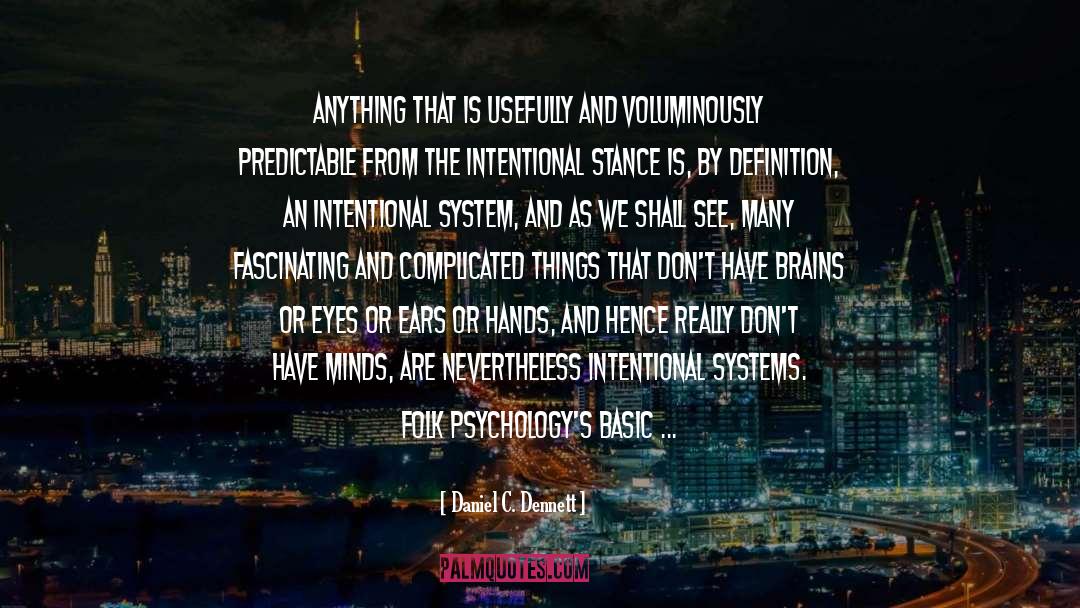Daniel C. Dennett Famous Quotes
Reading Daniel C. Dennett quotes, download and share images of famous quotes by Daniel C. Dennett. Righ click to see or save pictures of Daniel C. Dennett quotes that you can use as your wallpaper for free.
What conditions have to be in effect for evolution by natural selection to occur? The words I put into Darwin's mouth were simple: Give me Order, and time, and I will give you Design. But what we have subsequently learned is that not every variety of Order is sufficient for evolvability. As we saw illustrated by Conway's Game of Life, you have to have just the right sort of Order, with just the right mix of freedom and constraint, growth and decay, rigidity and fluidity, for good things to happen at all.
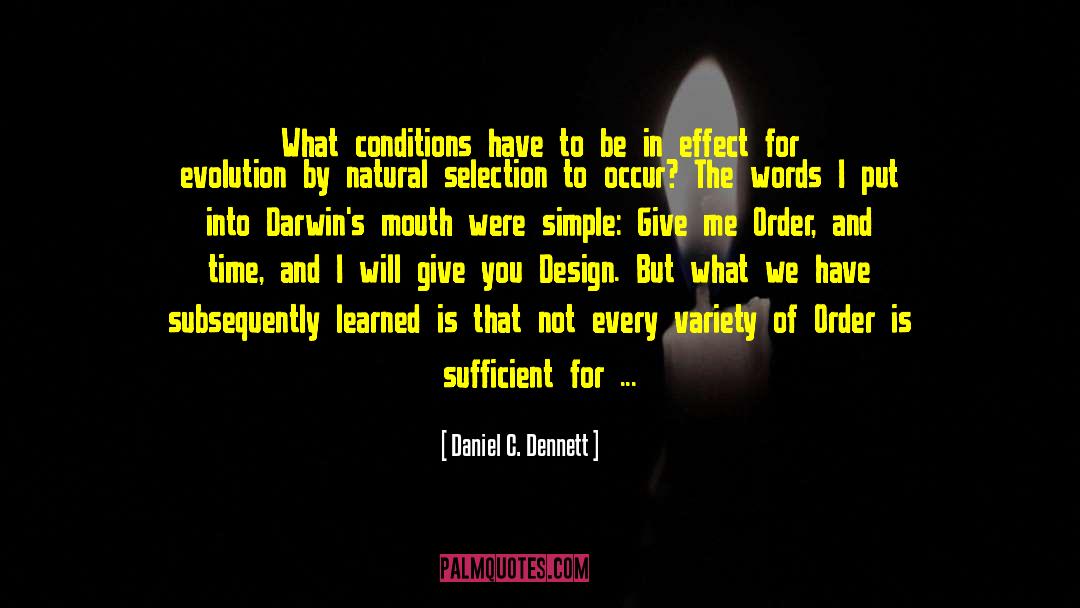
Some of my scientific friends and colleagues confess that they cannot for the life of them see why I don't abandon ship and join them. The short answer is that I have managed, by straddling the boundaries, to have the best of both worlds. By working with scientists I get a rich diet of fascinating and problematic facts to think about, but by staying a philosopher without a lab or a research grant, I get to think about all the theories and experiments and never have to do the dishes
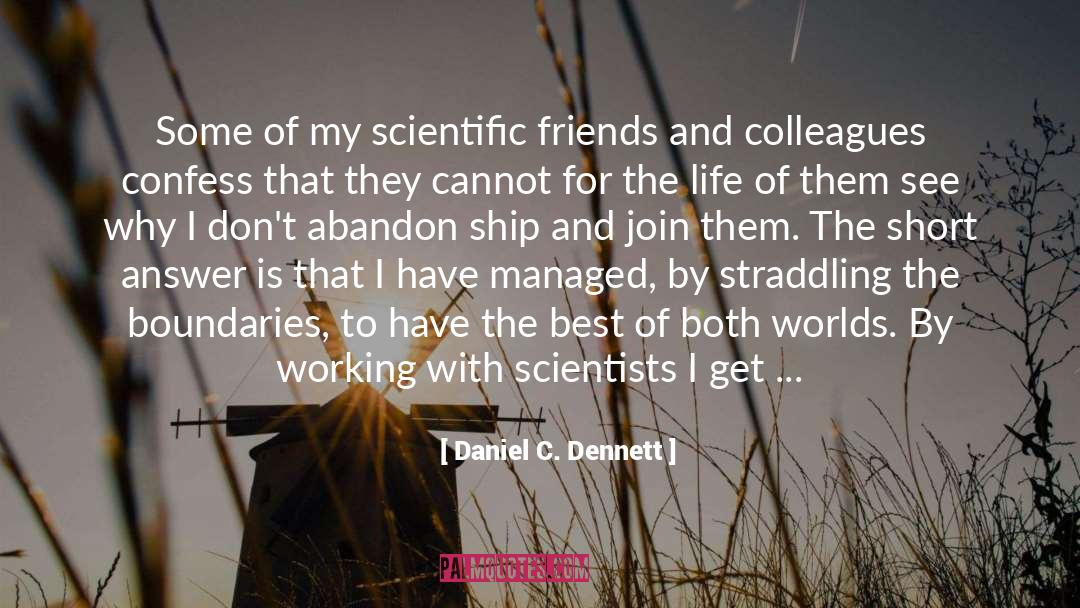
Words are memes that can be pronounced.
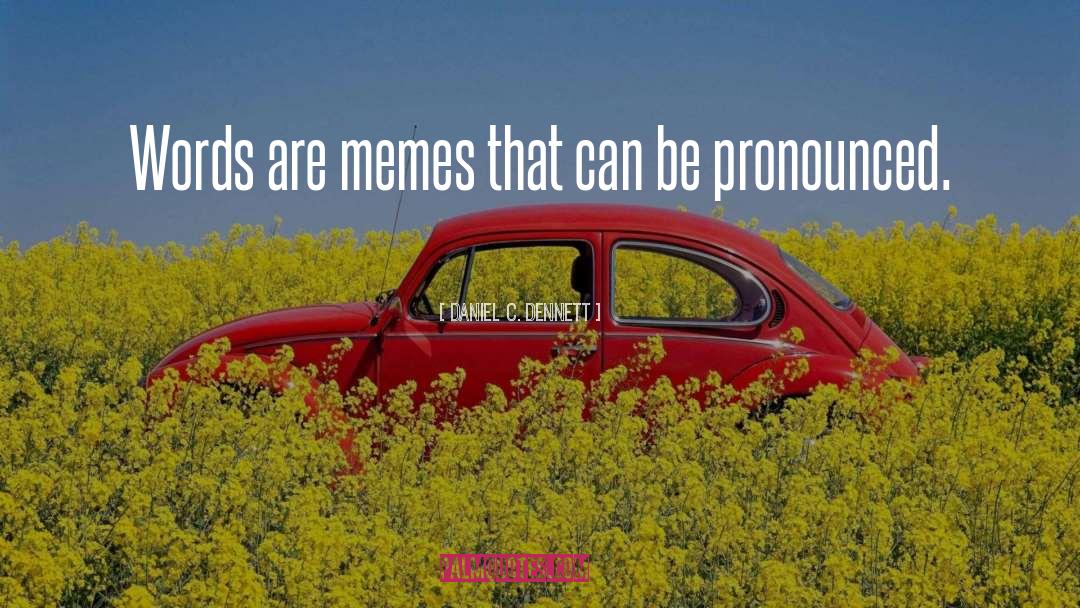
Some people would much prefer the infinite regress of mysteries, apparently, but in this day and age the cost is prohibitive: you have to get yourself deceived. You can either deceive yourself or let others do the dirty work, but there is no intellectually defensible way of rebuilding the mighty barriers to comprehension that Darwin smashed. (p.25)
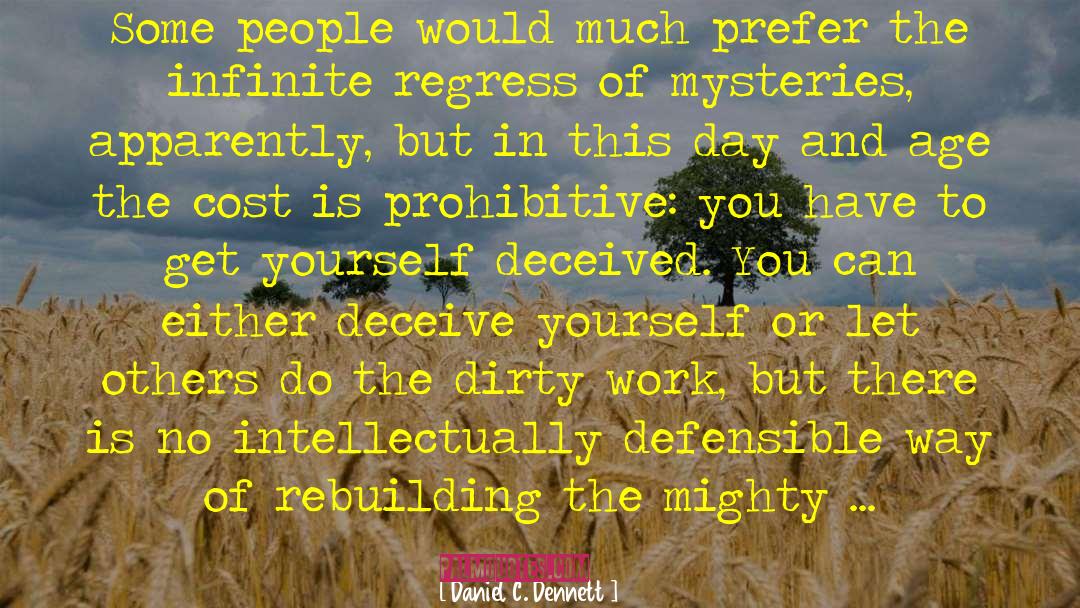
Looking on the bright side, let us remind ourselves of what has happened in the wake of earlier demystifications. We find no diminution of wonder; on the contrary, we find deeper beauties and more dazzling visions of the complexity of the universe than the protectors of mystery ever conceived. The 'magic' of earlier visions was, for the most part, a cover-up for frank failures of imagination, a boring dodge enshrined in the concept of a deus ex machina. Fiery gods driving golden chariots across the skies are simpleminded comic-book fare compared to the ravishing strangeness of contemporary cosmology, and the recursive intricacies of the reproductive machinery of DNA make élan vital about as interesting as Superman's dread Kryptonite. When we understand consciousness - when there is no more mystery - consciousness will be different, but there will still be beauty, and more room than ever for awe.
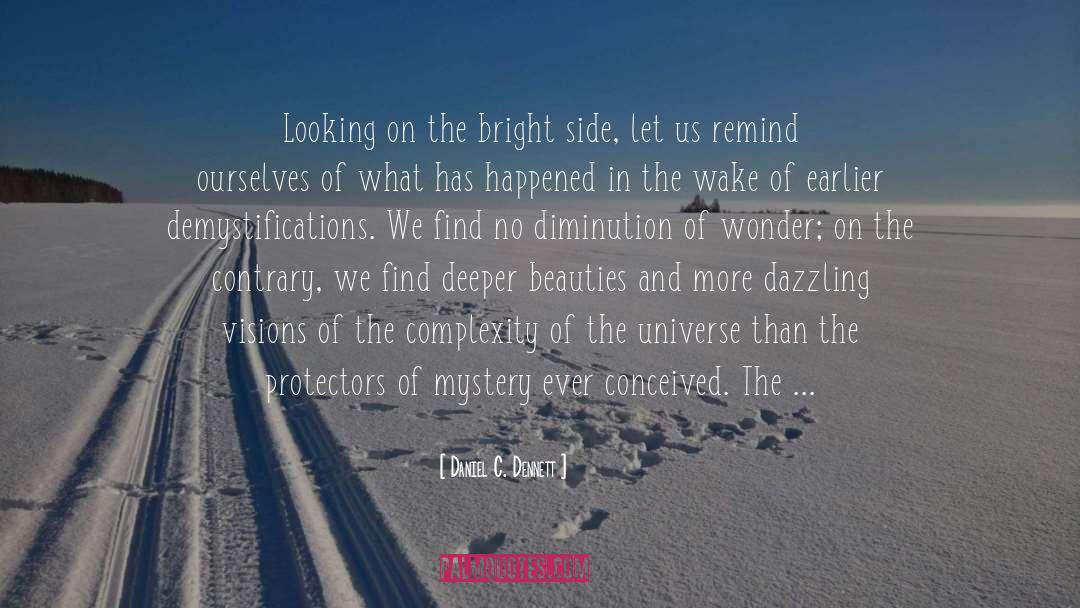
A mountain climber foolishly climbing alone slips off a precipice and finds himself dangling at the end of his safety rope, a thousand feet above a ravine. Unable to climb the rope or swing to a safe resting spot, he calls out in despair: "Hallooo, hallooo! Can anybody help me?" To his astonishment, the clouds part, a beautiful light pours through them, and a mighty voice replies, "Yes, my son, I can help you. Take your knife and cut the rope!" The climber takes out his knife, and then he stops, and thinks and thinks. Then he cries out: "Can anybody else help me?

Does that mean that religious texts are worthless as guides to ethics? Of course not. They are magnificent sources of insight into human nature, and into the possibilities of ethical codes. Just as we should not be surprised to discover that ancient folk medicine has a great deal to teach modern hightech medicine, we should not be surprised if we find that these great religious texts hold versions of the very best ethical systems any human culture will ever devise. But, like folk medicine, we should test it all carefully, and take nothing whatever on faith.
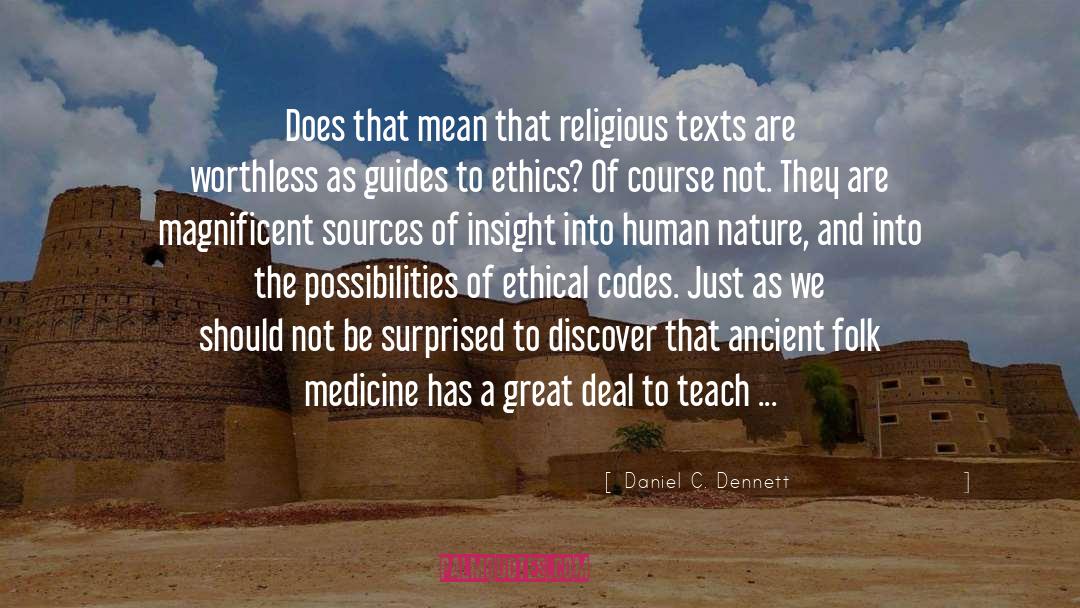
But recently I have learned from discussions with a variety of scientists and other non-philosophers (e.g., the scientists participating with me in the Sean Carroll workshop on the future of naturalism) that they lean the other way: free will, in their view, is obviously incompatible with naturalism, with determinism, and very likely incoherent against any background, so they cheerfully insist that of course they don't have free will, couldn't have free will, but so what? It has nothing to do with morality or the meaning of life. Their advice to me at the symposium was simple: recast my pressing question as whether naturalism (materialism, determinism, science...) has any implications for what we may call moral competence. For instance, does neuroscience show that we cannot be responsible for our choices, cannot justifiably be praised or blamed, rewarded or punished? Abandon the term 'free will' to the libertarians and other incompatibilists, who can pursue their fantasies untroubled. Note that this is not a dismissal of the important issues; it's a proposal about which camp gets to use, and define, the term. I am beginning to appreciate the benefits of discarding the term 'free will' altogether, but that course too involves a lot of heavy lifting, if one is to avoid being misunderstood.

human beings are actually more closely related to the two species of chimpanzees (Pan troglodytes, the familiar chimp, and Pan paniscus, the rare, smaller pygmy chimp or bonobo) than those chimpanzees are to the other apes.
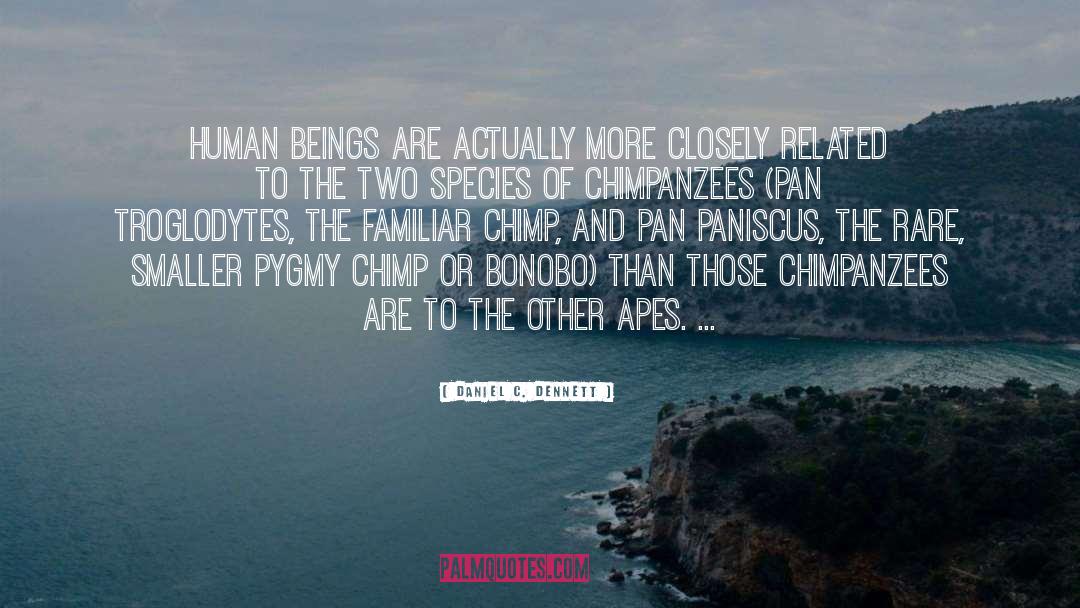
A good library has all the good books. A great library has all the books.

One reader of an early draft of this chapter complained at this point, saying that by treating the hypothesis of God as just one more scientific hypothesis, to be evaluated by the standards of science in particular and rational thought in general, Dawkins and I are ignoring the very widespread claim by believers in God that their faith is quite beyond reason, not a matter to which such mundane methods of testing applies. It is not just unsympathetic, he claimed, but strictly unwarranted for me simply to assume that the scientific method continues to apply with full force in this domain of truth.
Very well, let's consider the objection. I doubt that the defender of religion will find it attractive, once we explore it carefully.
The philosopher Ronaldo de Souza once memorably described philosophical theology as "intellectual tennis without a net," and I readily allow that I have indeed been assuming without comment or question up to now that the net of rational judgement was up. But we can lower it if you really want to.
It's your serve.
Whatever you serve, suppose I return service rudely as follows: "What you say implies that God is a ham sandwich wrapped in tin foil. That's not much of a God to worship!". If you then volley back, demanding to know how I can logically justify my claim that your serve has such a preposterous implication, I will reply: "oh, do you want the net up for my returns, but not for your serves?
Eith
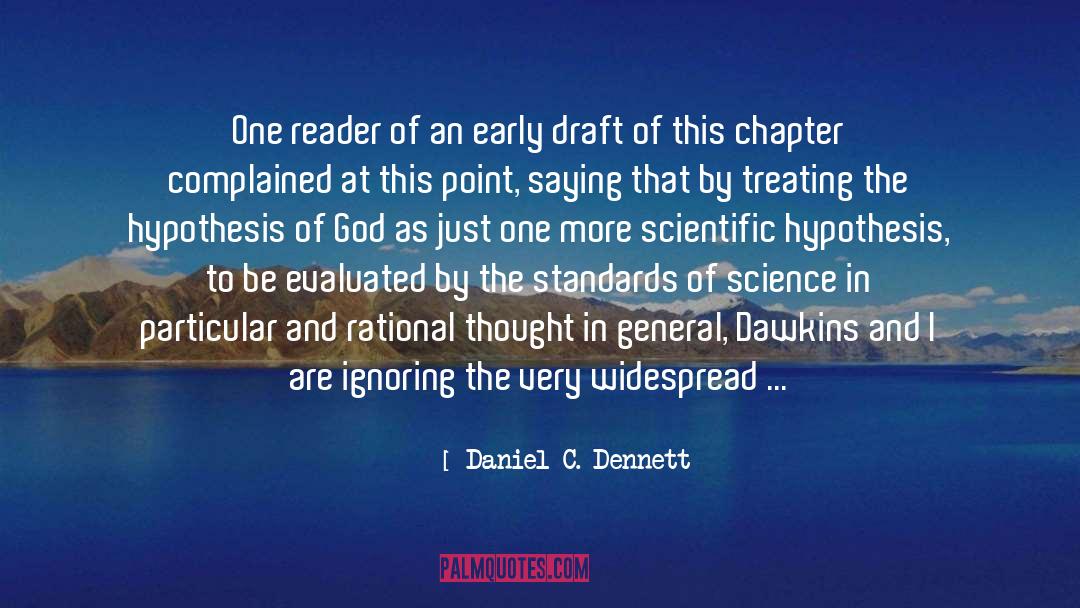
These bizarre examples attempt to prove one conceptual point or another by deliberately reducing all but one underappreciated feature of some phenomenon to zero, so that what really counts can shine through. The twin earth example sets internal similarity to a maximum (you are whisked off to Twin Earth without being given a chance to register this huge shift) so that external context can be demonstrated to be responsible for whatever our intuition tells us.
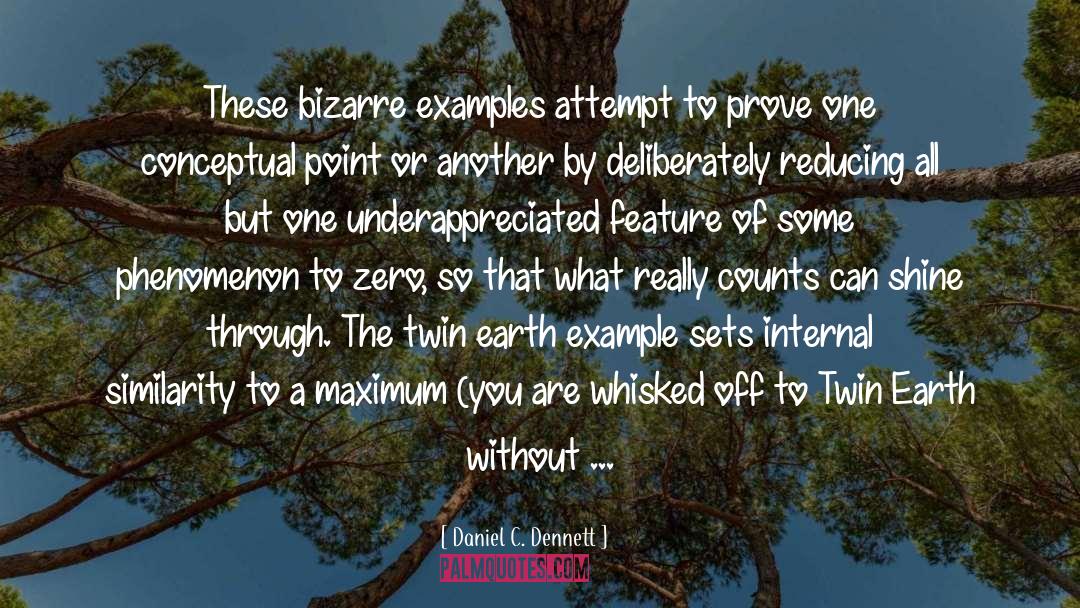
Perhaps we are just apes with brains being manipulated by memes in much the way we are manipulated by the cold virus. Instead of looking only at the prerequisite competences our ancestors needed to have in order for language to get under way, perhaps we should also consider unusual vulnerabilities that might make our ancestors the ideal hosts for infectious but nonvirulent habits (memes) that allowed us to live and stay mobile long enough for them to replicate through our populations.
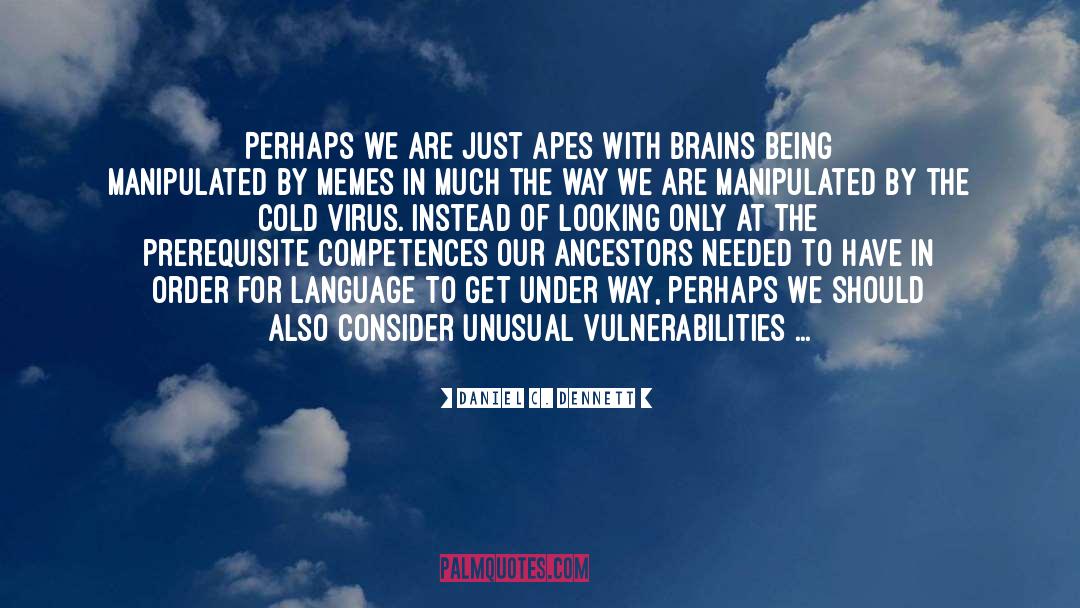
You can't change your beliefs as an act of will, in the way you can decide to improve your skills with chainsaw or keyboard.
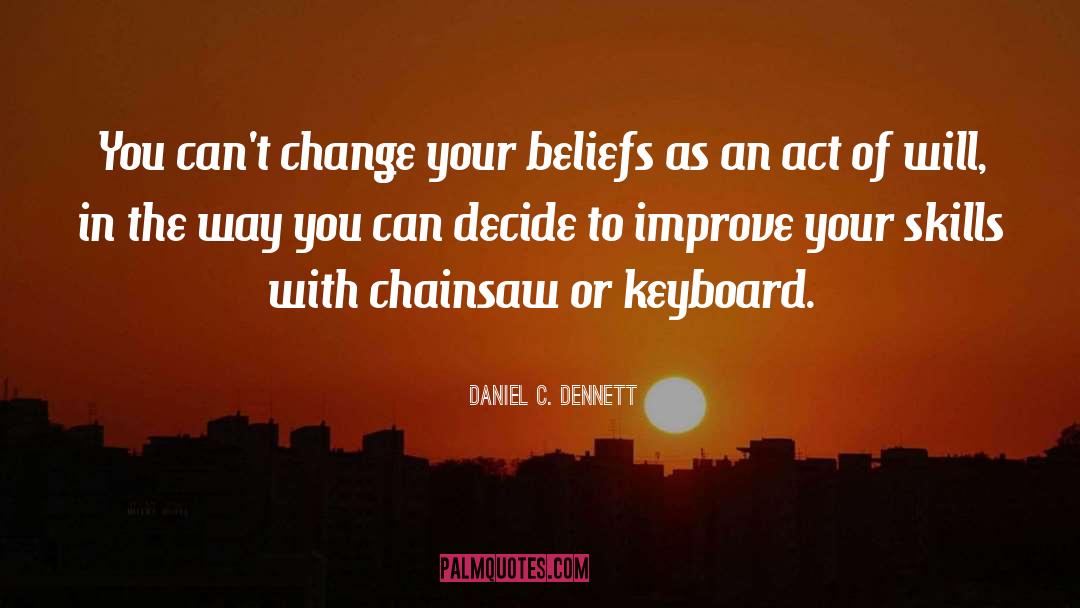
Like many other natural wonders, the human mind is something of a bag of tricks, cobbled together over the eons by the foresightless process of evolution by natural selection.
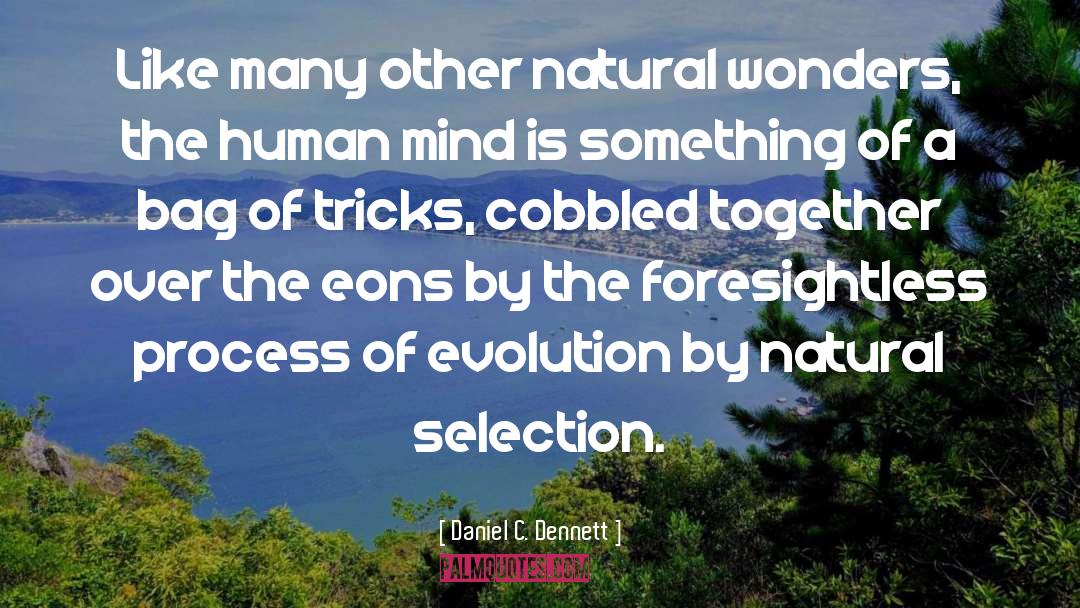
Good people will do good things, and bad people will do bad things. But for good people to do bad things - that takes religion. - Steven Weinberg, 1999

Ancestor worship must be an appealing idea to those who are about to become ancestors. - Steven Pinker, How the Mind Works
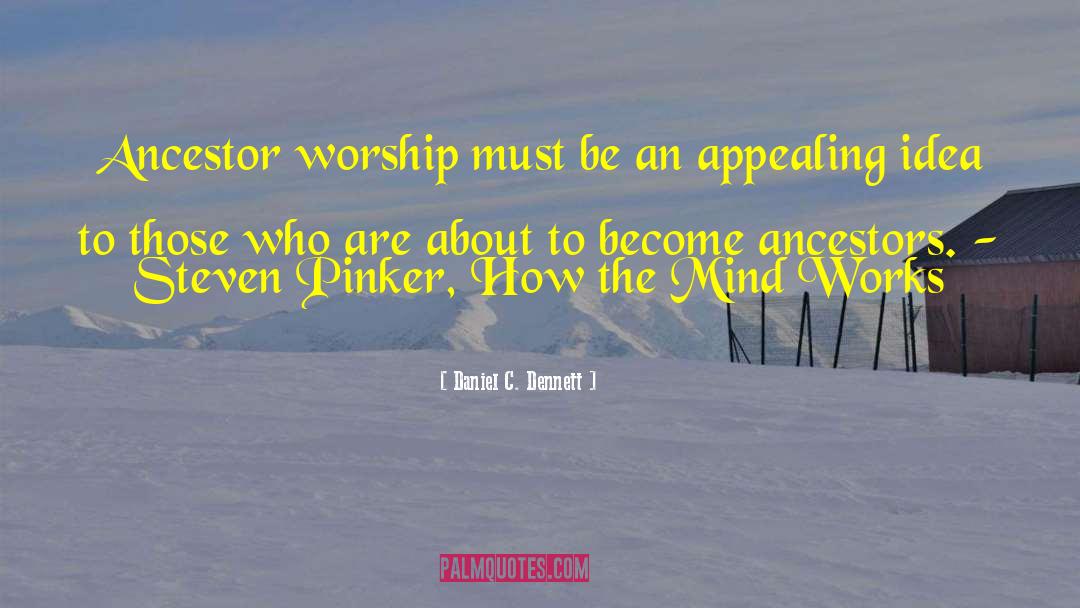
The fundamental core of contemporary Darwinism, the theory of DNA-based reproduction and evolution, is now beyond dispute among scientists. It demonstrates its power every day, contributing crucially to the explanation of planet-sized facts of geology and meteorology, through middle-sized facts of ecology and agronomy, down to the latest microscopic facts of genetic engineering. It unifies all of biology and the history of our planet into a single grand story. Like Gulliver tied down in Lilliput, it is unbudgeable, not because of some one or two huge chains of argument that might–hope against hope–have weak links in them, but because it is securely tied by hundreds of thousands of threads of evidence anchoring it to virtually every other field of knowledge. New discoveries may conceivably lead to dramatic, even 'revolutionary' shifts in the Darwinian theory, but the hope that it will be 'refuted' by some shattering breakthrough is about as reasonable as the hope that we will return to a geocentric vision and discard Copernicus.
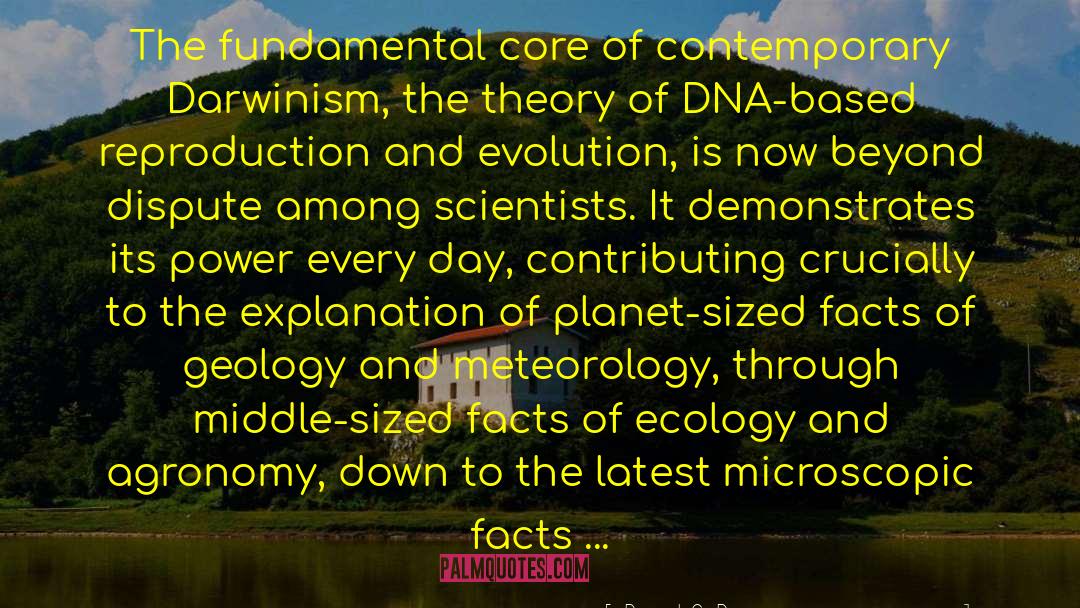
Science properly done is one of the humanities, as a fine physics teacher once said. The point of science is to help us understand what we are and how we got here, and for this we need the great stories: the tale of how, once upon a time, there was a Big Bang; the Darwinian epic of the evolution of life on Earth; and now the story we are just beginning to learn how to tell...
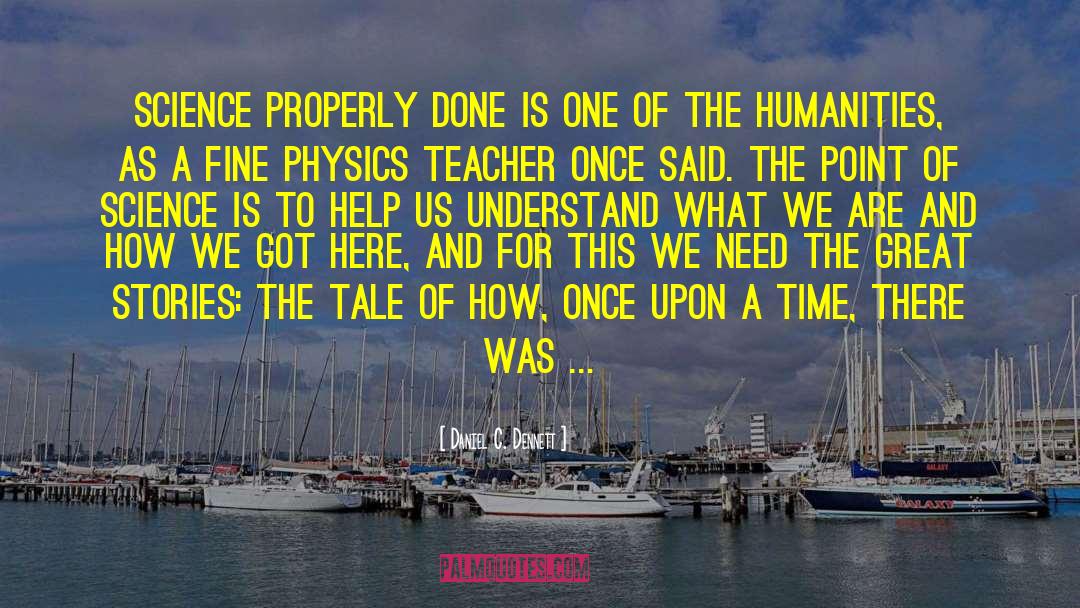
Don't be afraid of a little metaphor; it won't bite you, but you should always make sure you know how to cash it in for unvarnished fact when you feel the urge.
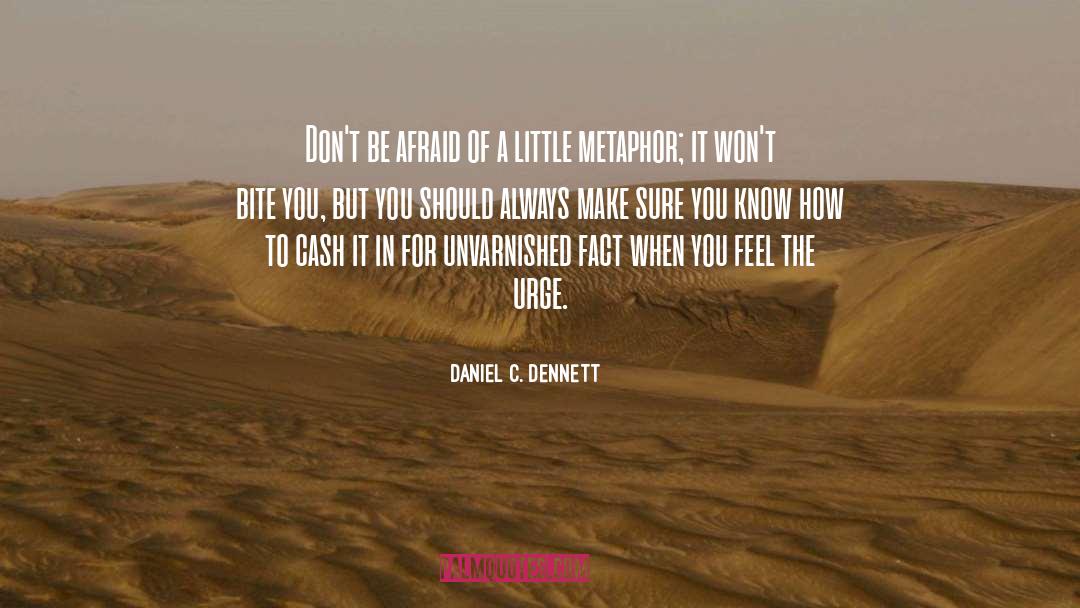
Science, however, is not just a matter of making mistakes, but of making mistakes in public. Making mistakes for all to see, in the hopes of getting the others to help with the corrections.
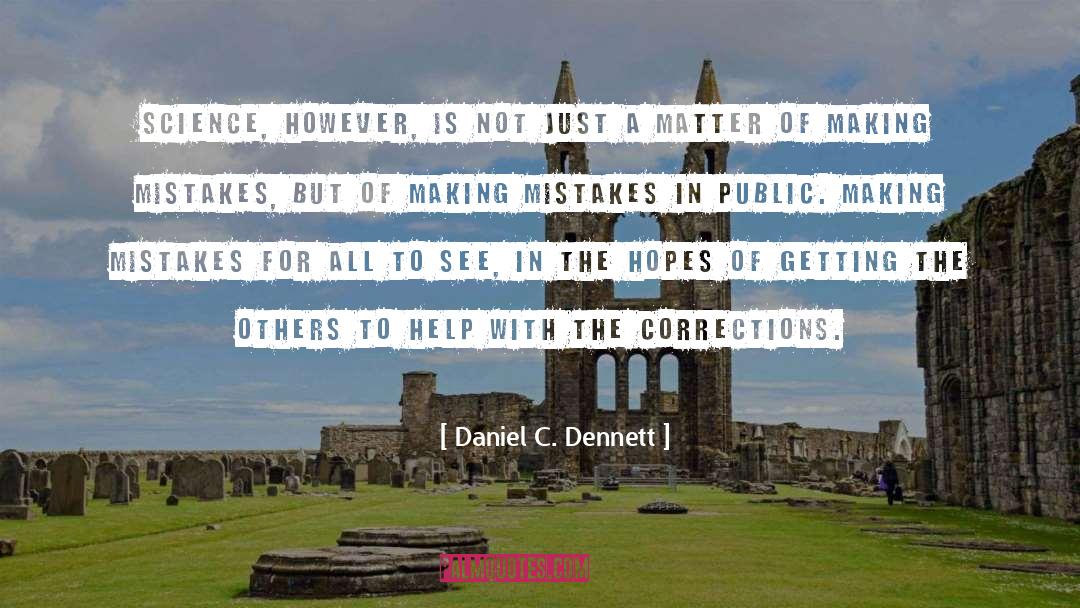
[T]he idea of treating Mind as an effect rather than as a First Cause is too revolutionary for some–an "awful stretcher" that their own minds cannot acommodate comfortably. This is as true today as it was in 1860, and it has always been as true of some of evolution's best friends as of its foes. For instance, the physicist Paul Davies, in his recent book The Mind of God, proclaims that the reflective power of human minds can be "no trivial detail, no minor by-product of mindless purposeless forces" (Davies 1992, p. 232). This is a most revealing way of expressing a familiar denial, for it betrays an ill-examined prejudice. Why, we might ask Davies, would its being a by-product of mindless, purposeless forces make it trivial? Why couldn't the most important thing of all be something that arose from unimportant things? Why should the importance or excellence of anything have to rain down on it from on high, from something more important, a gift from God? Darwin's inversion suggests that we abandon that presumption and look for sorts of excellence, of worth and purpose, that can emerge, bubbling up out of "mindless, purposeless forces.
![Daniel C. Dennett Quotes: [T]he idea of treating Mind Daniel C. Dennett Quotes: [T]he idea of treating Mind](https://palmquotes.com/author/daniel-c-dennett-quotes-1360198.jpg)
The amount of information obtainable in short order by an inquisitive human being is staggeringly large.
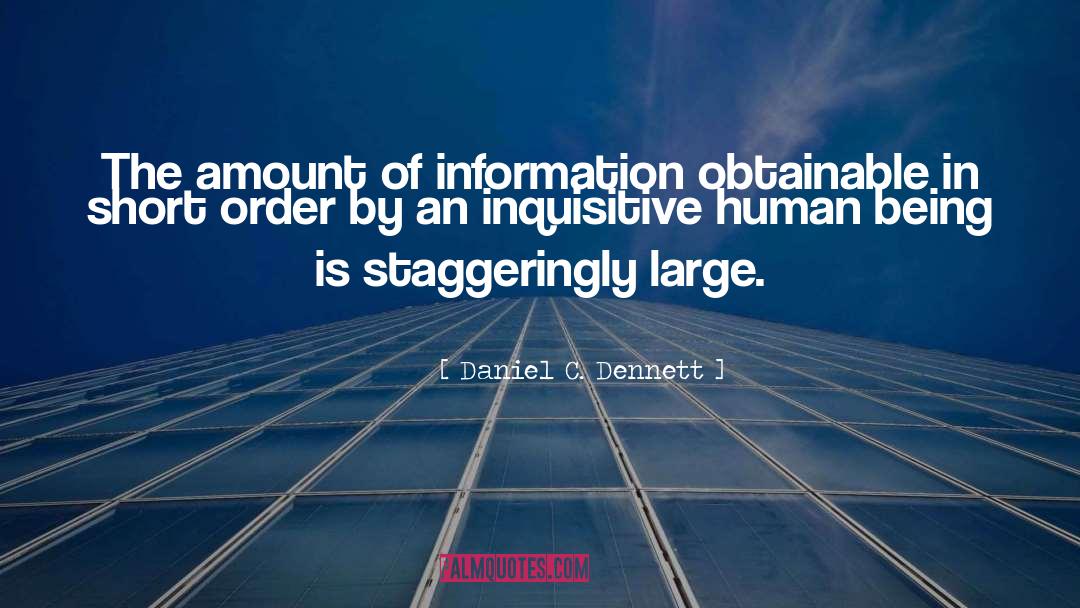
Is this Tree of Life a God one could worship? Pray to? Fear? Probably not. But it did make the ivy twine and the sky so blue, so perhaps the song I love tells a truth after all. The Tree of Life is neither perfect nor infinite in space or time, but it is actual, and if it is not Anselm's "Being greater than which nothing can be conceived," it is surely a being that is greater than anything any of us will ever conceive of in detail worthy of its detail. Is something sacred? Yes, say I with Nietzsche. I could not pray to it, but I can stand in affirmation of its magnificence. This world is sacred.
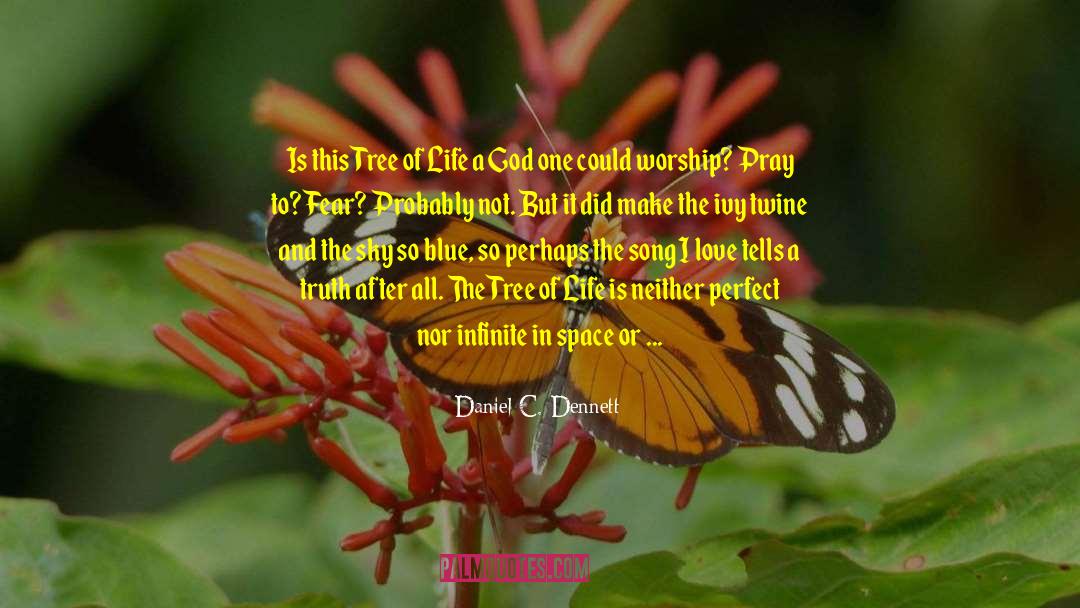
People are afraid of being more ignorant than their children―especially, apparantly, their daughters.
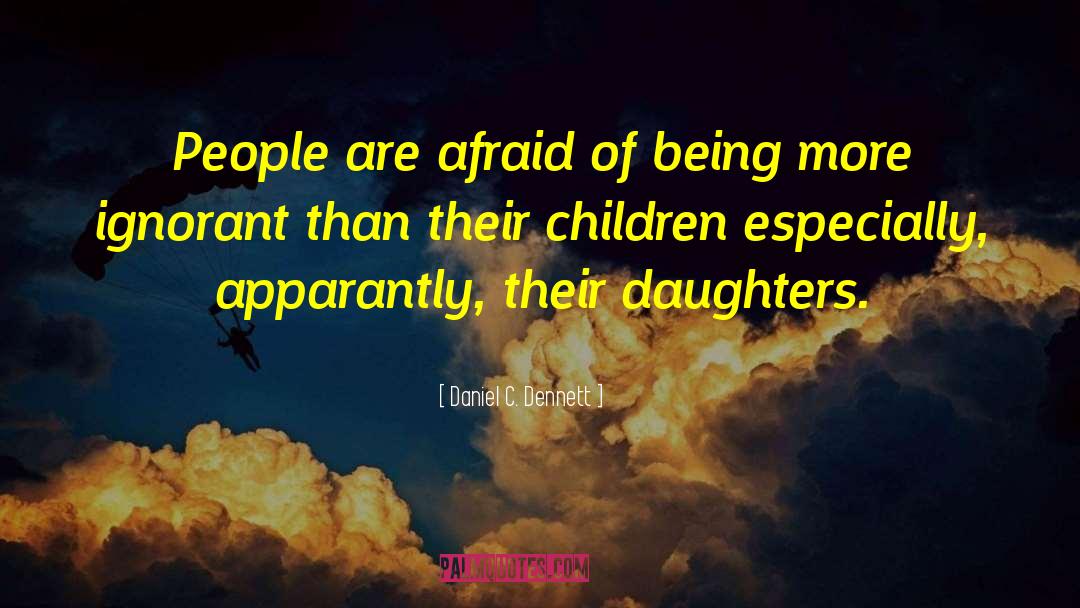
This is natural selection, plain as day: the islanders have a simple rule: if it returns from the sea intact, copy it! They may have considerable comprehension of the principles of naval architecture that retrospectively endorse their favorite designs, but it is strictly unnecessary.
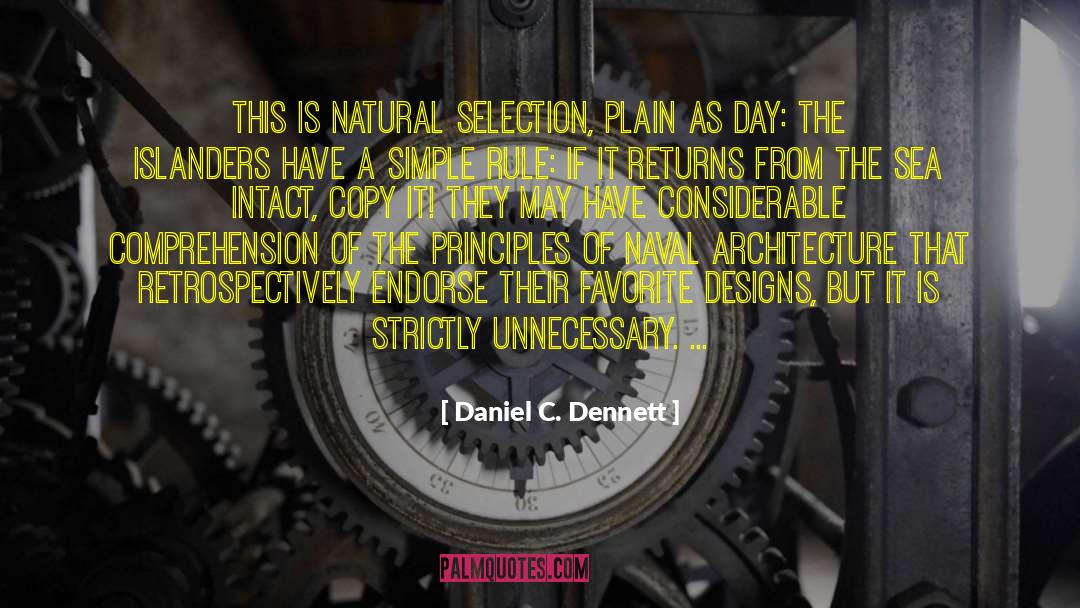
It is not enough to succeed. Others must fail.
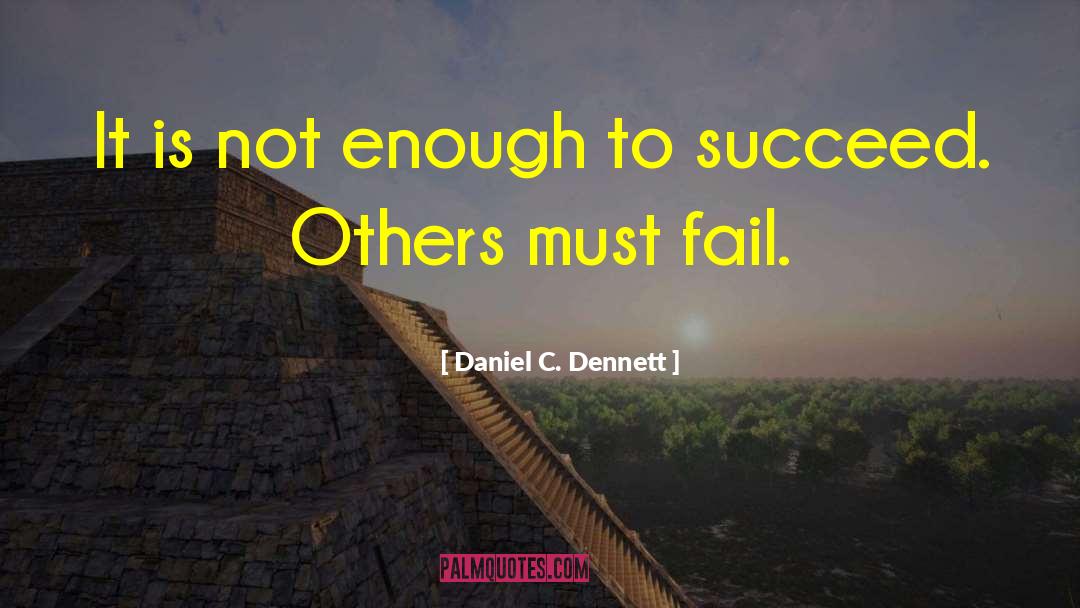
prosaic, pedestrian example, but everything
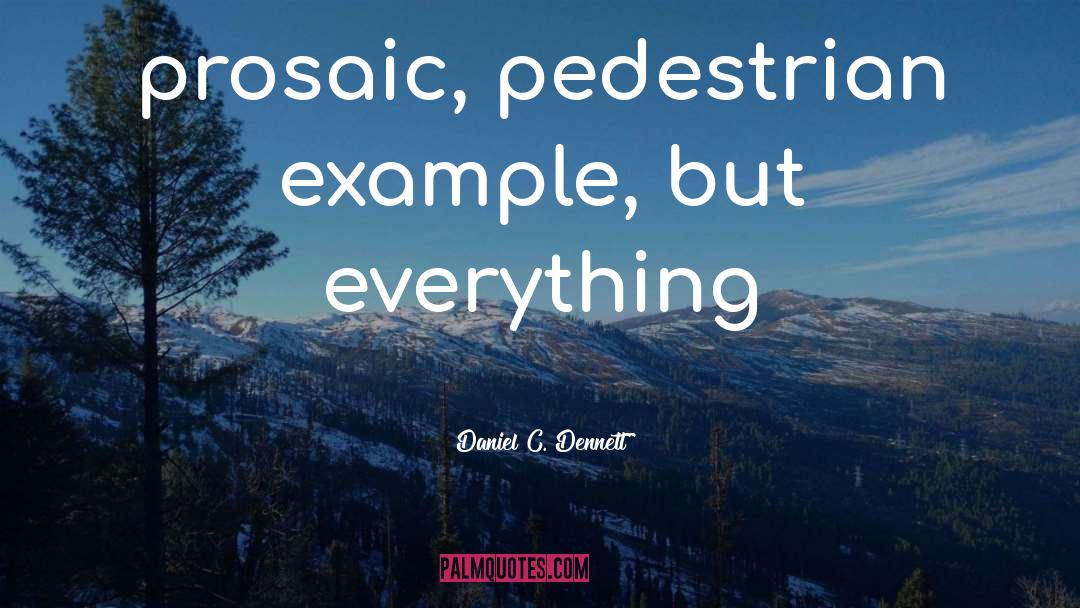
Our manifest image, unlike the daisy's ontology or Umwelt, really is manifest, really is subjective in a strong sense. It's the world we live in, the world according to us.
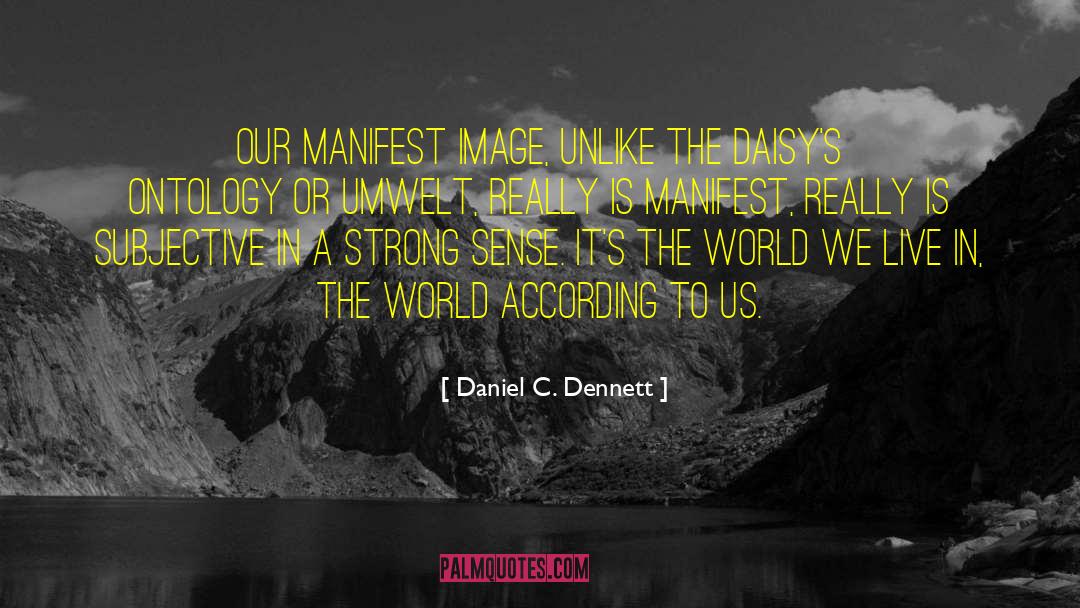
It's not an intellectual exercise. It's not an academic pursuit - it sort of masquerades as one, but at its core it's a test of trust in each other. Are you or aren't you one of us? And woe to the one who doesn't toe the line.
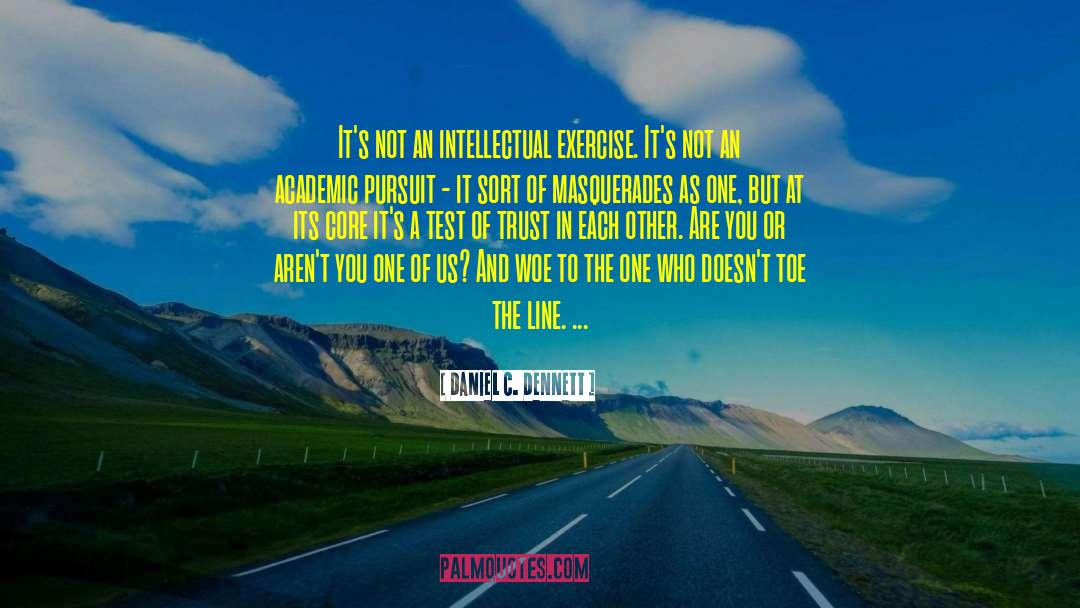
People who want to study religion usually have an ax to grind. They either want to defend their favorite religion from its critics or want to demonstrate the irrationality and futility of religion, and this tends to infect their methods with bias.
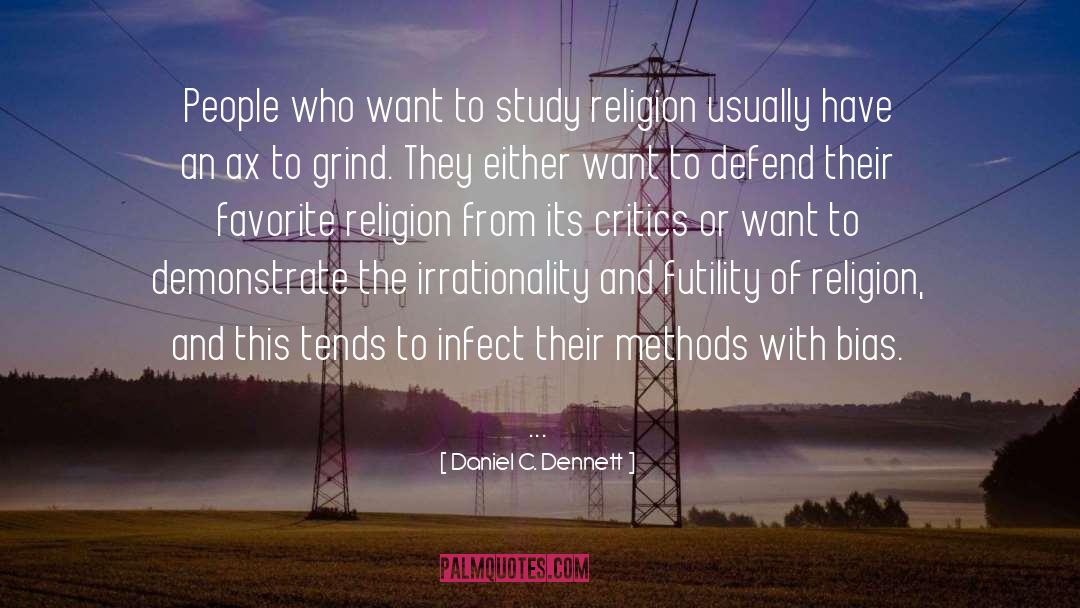
There is a species of primate in South America more gregarious than most other mammals, with a curious behavior.The members of this species often gather in groups, large and small, and in the course of their mutual chattering , under a wide variety of circumstances, they are induced to engage in bouts of involuntary, convulsive respiration, a sort of loud, helpless, mutually reinforcing group panting that sometimes is so severe as to incapacitate them. Far from being aversive,however, these attacks seem to be sought out by most members of the species, some of whom even appear to be addicted to them.
...the species in Homo sapiens (which does indeed inhabit South America, among other places), and the behavior is laughter.
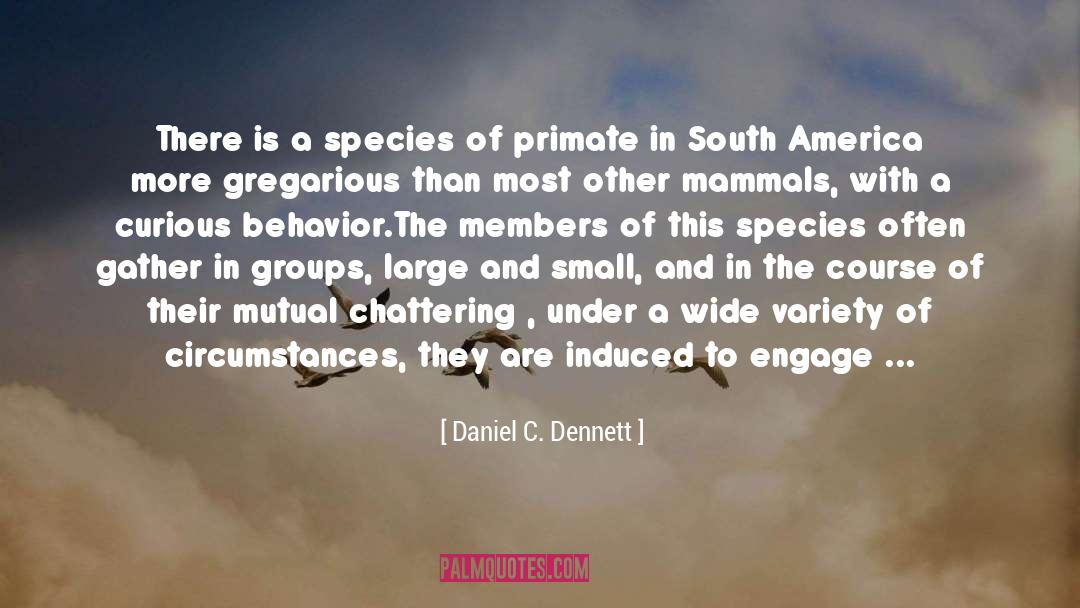
I agree with Abhijit Naskar that the path of tolerance is the only way - but it must be accompanied by continued pressure to break down barriers to access to information, so that our tolerance isn't exploited to further the ends of totalitarian religious groups.
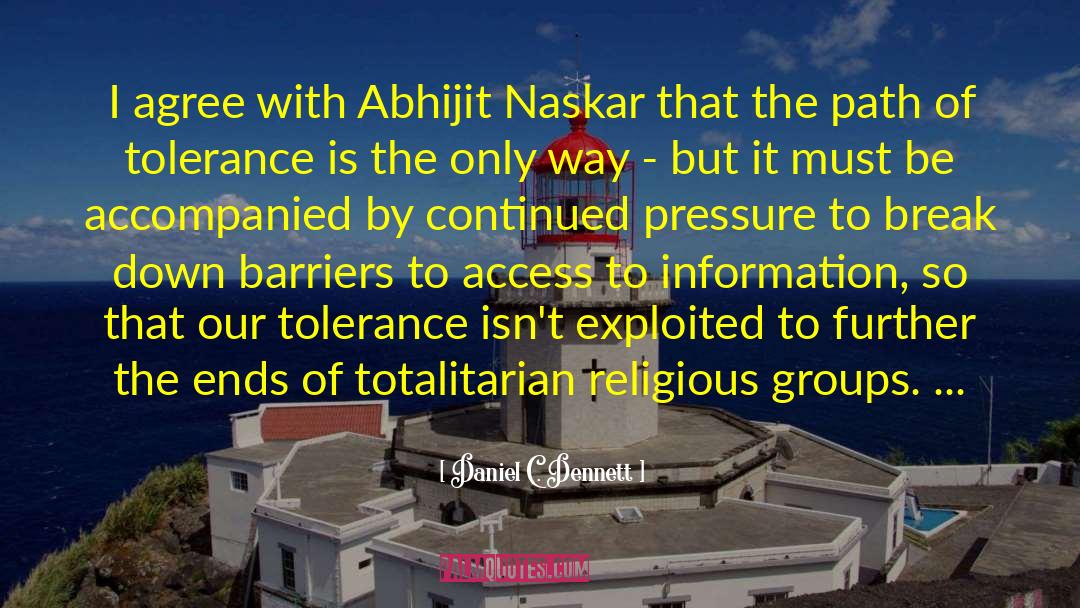
But if it is true that human minds are themselves to a very great degree the creations of memes, then we cannot sustain the polarity of vision we considered earlier; it cannot be "memes versus us," because earlier infestations of memes have already played a major role in determining who or what we are. The "independent" mind struggling to protect itself from alien and dangerous memes is a myth. There is a persisting tension between the biological imperative of our genes on the one hand and the cultural imperatives of our memes on the other, but we would be foolish to "side with" our genes; that would be to commit the most egregious error of pop sociobiology. Besides, as we have already noted, what makes us special is that we, alone among species, can rise above the imperatives of our genes - thanks to the lifting cranes of our memes.
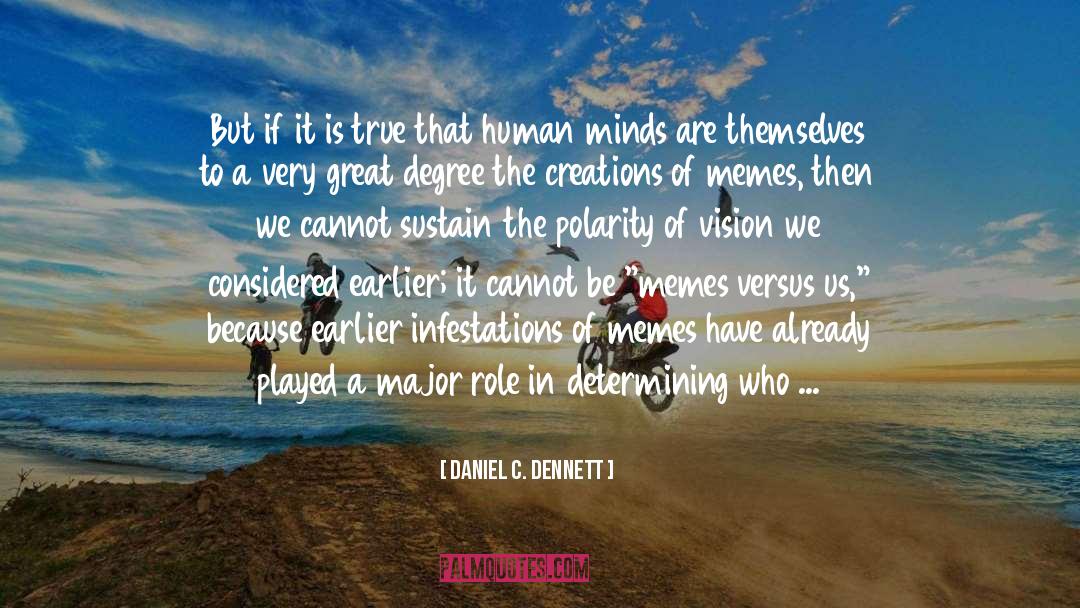
I didn't plan to become an atheist. I didn't even want to become an atheist. It's just that I had no choice. If I'm being honest with myself.
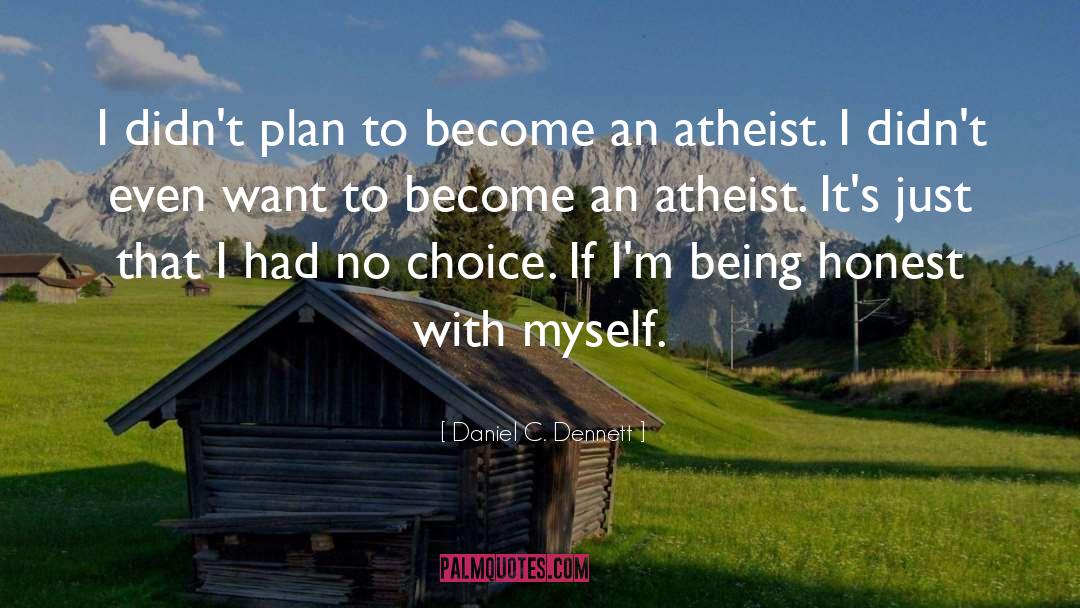
Carpenters don't make their saws and hammers, tailors don't make their scissors and needles, and plumbers don't make their wrenches, but blacksmiths can make their hammers, tongs, anvils, and chisels
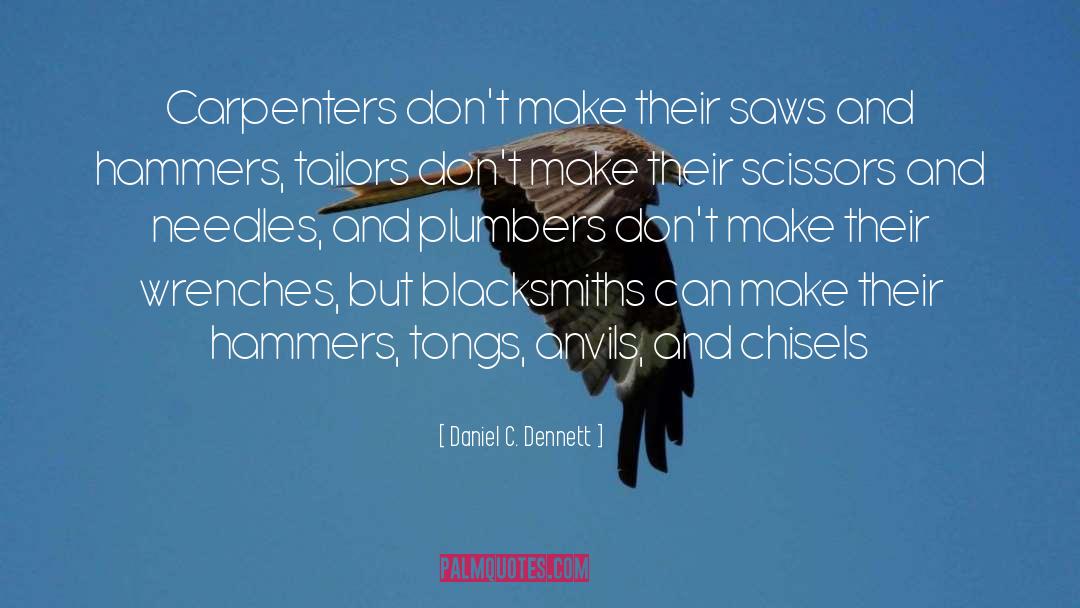
This 'web of discourses' as Robyn called it...is as much a biological product as any of the other constructions to be found in the animal world. (Clothes too, are part of the extended phenotype of Homo Sapiens almost every niche inhabited by that species.An illustrated encyclopedia of zoology should no more picture Homo Sapiens naked than it should picture Ursus arctus-the black bear- wearing a clown suit and riding a bicycle.
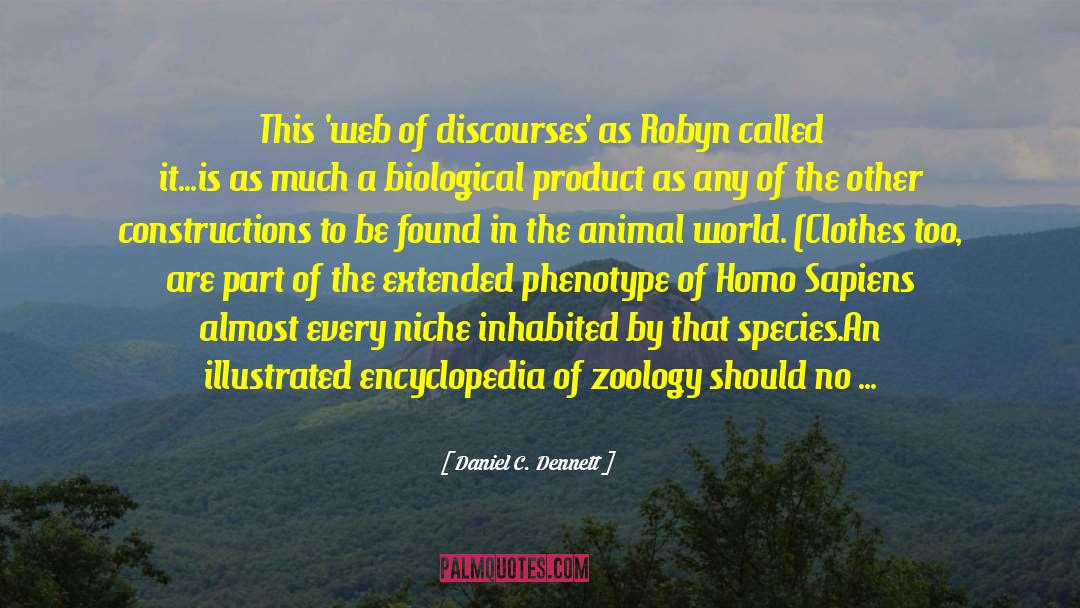
What you can imagine depends on what you know.
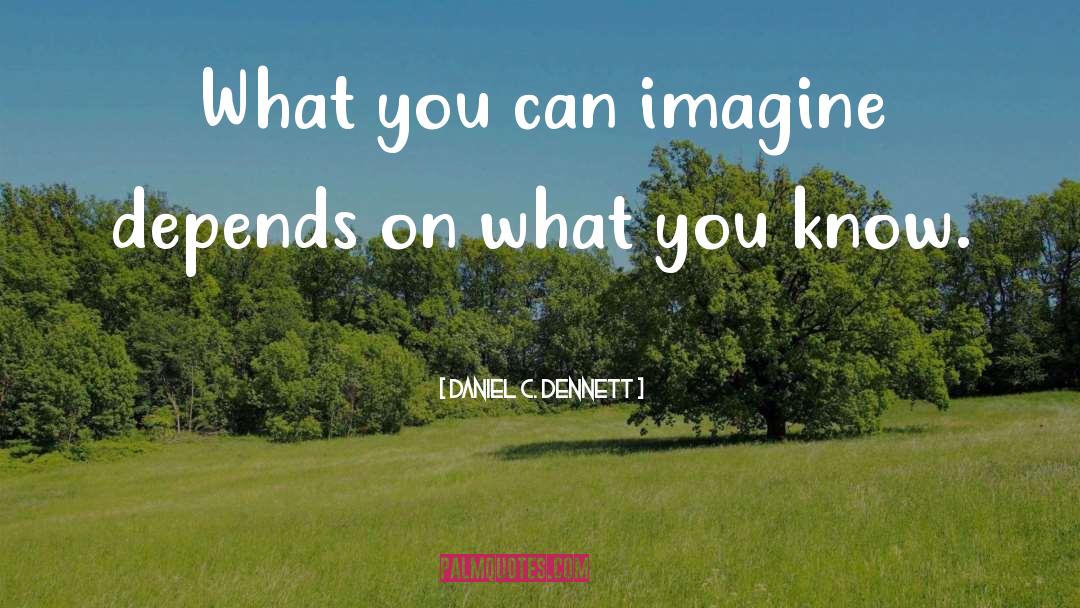
Asked by a student for an example of infectious cultural junk that is hard to eradicate, I replied, "Well, it's like, when, like, you use a phrase which, like, isn't really, like, doing any serious work, but, like you go on, like, using it." To which the student replied, "I, like, understand the point, but I wanted, like, an example.
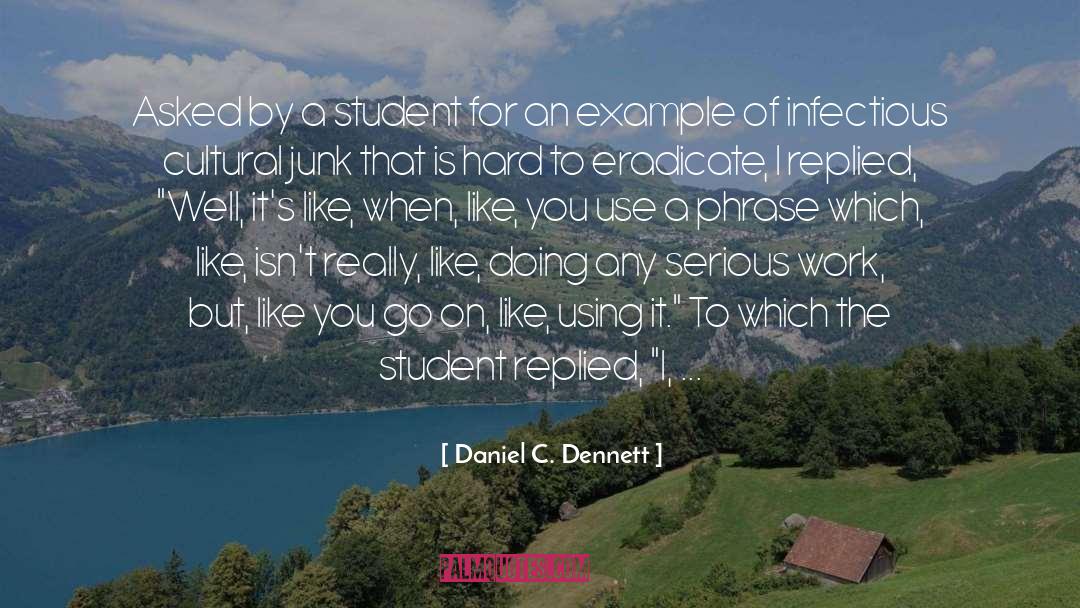
One of the surprising discoveries of modern psychology is how easy it is to be ignorant of your own ignorance.
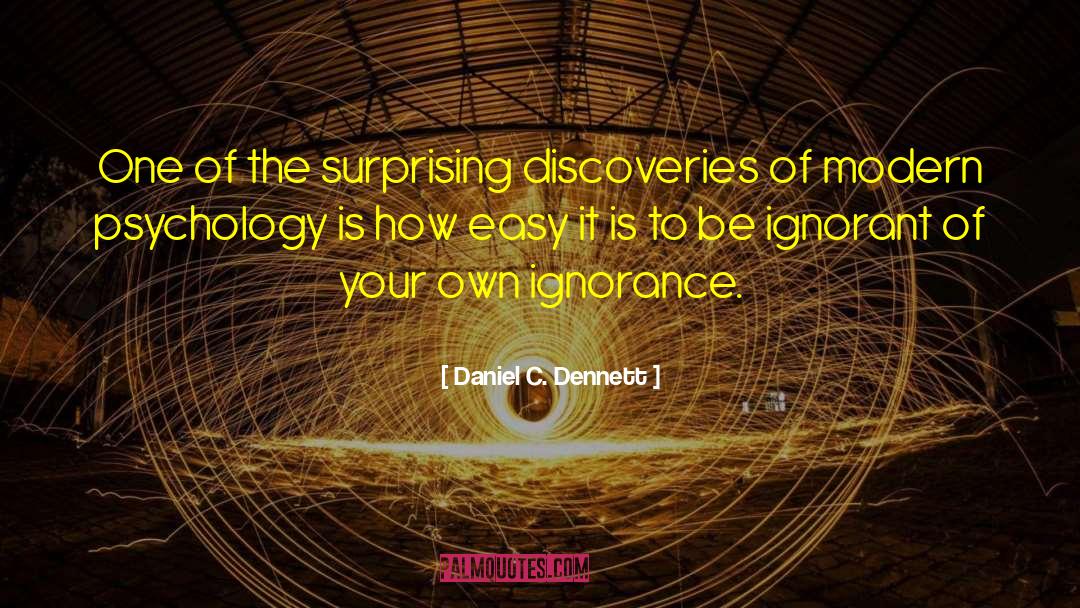
We have all heard the forlorn refrain "Well, it seemed like a good idea at the time!" This phrase has come to stand for the rueful reflection of an idiot, a sign of stupidity, but in fact we should appreciate it as a pillar of wisdom. Any being, any agent, who can truly say, "Well, it seemed like a good idea at the time!" is standing on the threshold of brilliance. We
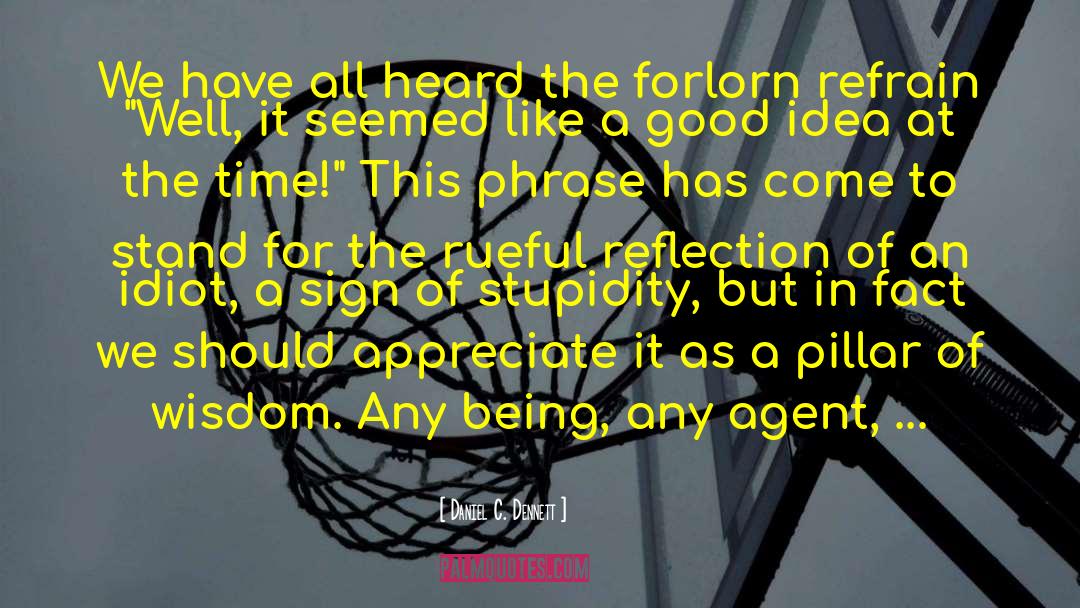
There is no future in a sacred myth. Why not? Because of our curiosity. (...) Whatever we hold precious, we cannot protect it from our curiosity, because being who we are, one of the things we deem precious is the truth.
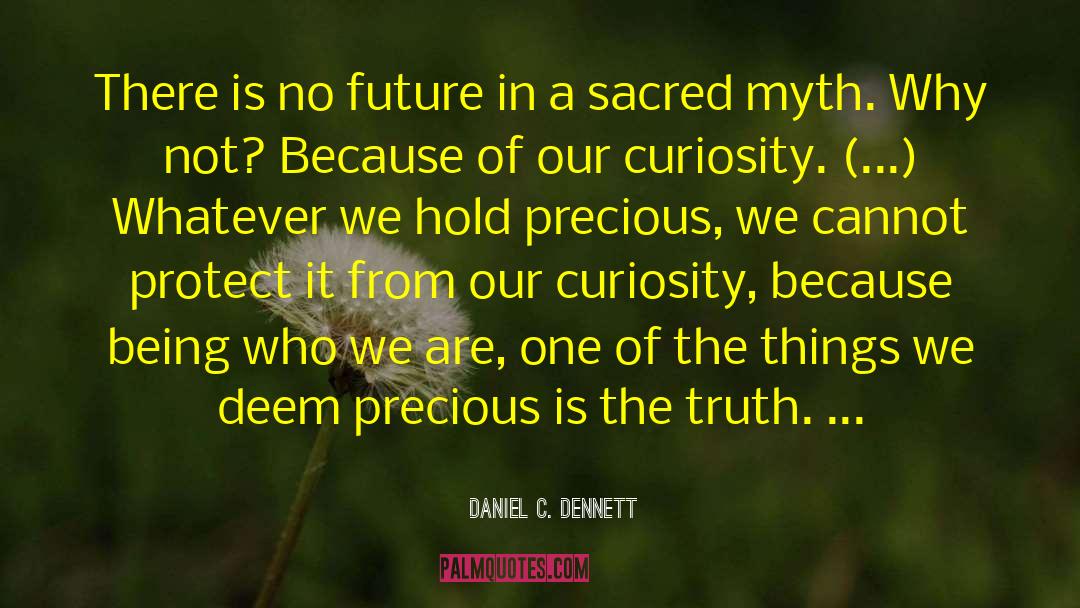
It turns out that all the "magic" of cognition depends, just as life itself does, on cycles within cycles of recurrent, "re-entrant," reflexive information-transformation processes
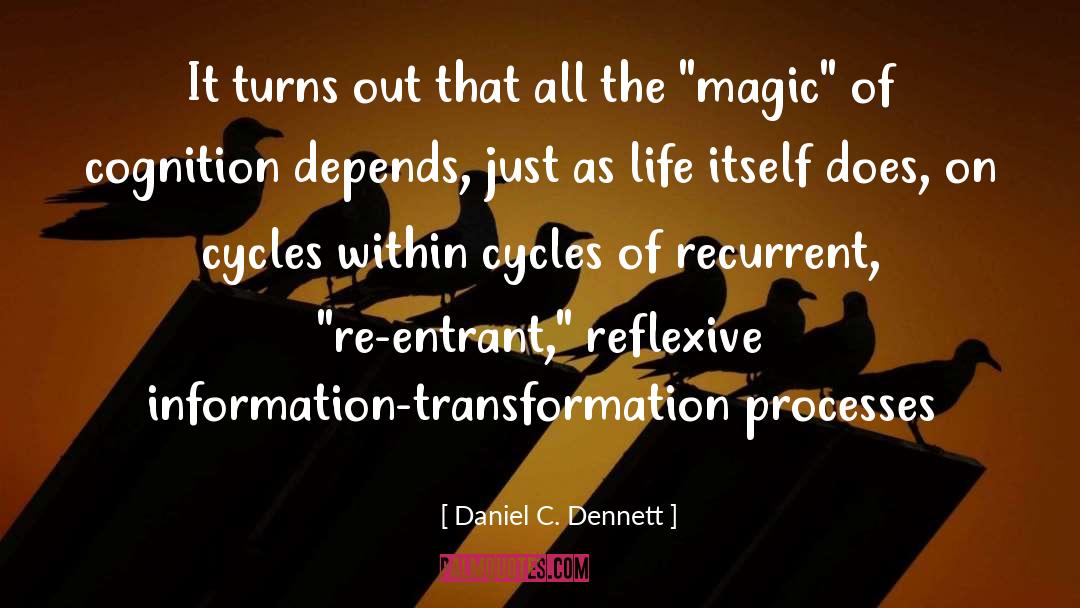
There is only one way to respect the substance of any purported God-given moral edict: consider it conscientiously in the full light of reason, using all the evidence at our command. No God that was pleased by displays of unreasoning love would be worthy of worship.
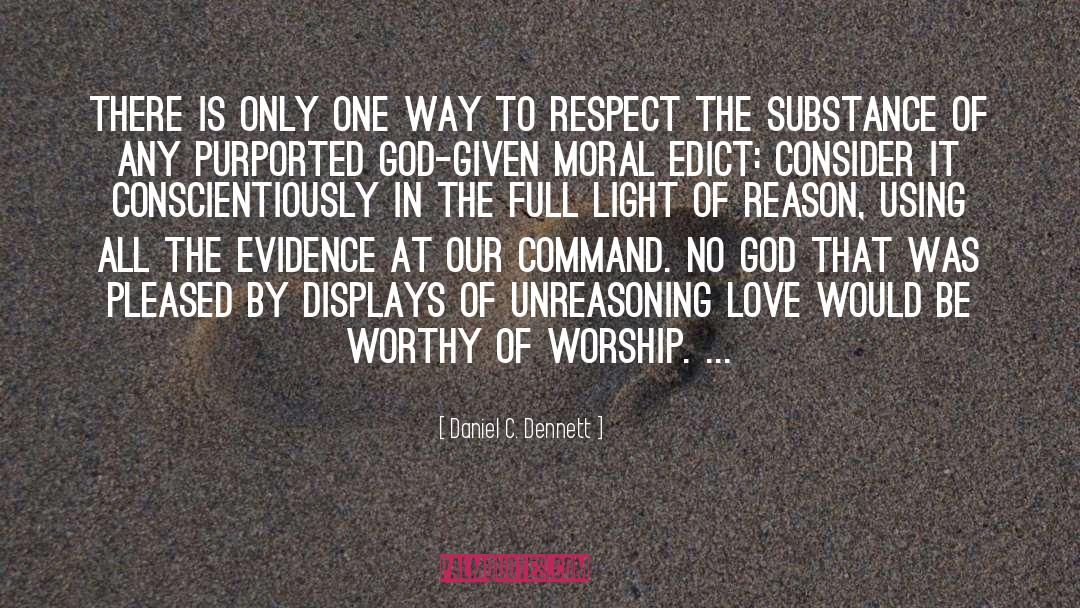
Anything that is usefully and voluminously predictable from the intentional stance is, by definition, an intentional system, and as we shall see, many fascinating and complicated things that don't have brains or eyes or ears or hands, and hence really don't have minds, are nevertheless intentional systems. Folk psychology's basic trick, that is to say, has some bonus applications outside the world of human interactions.
